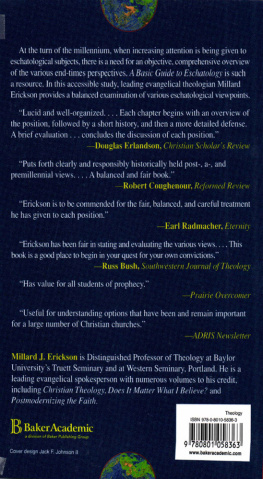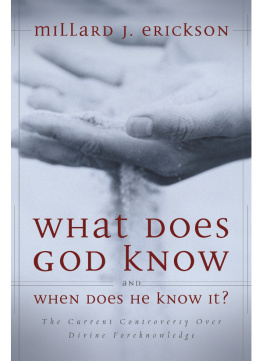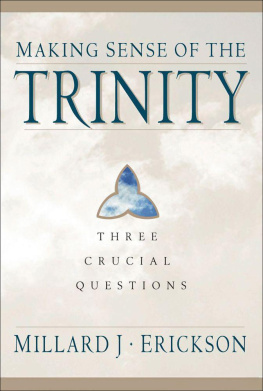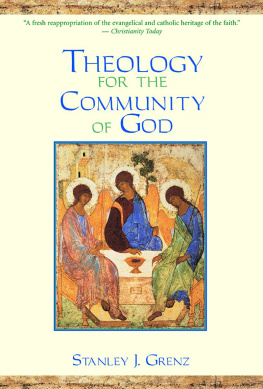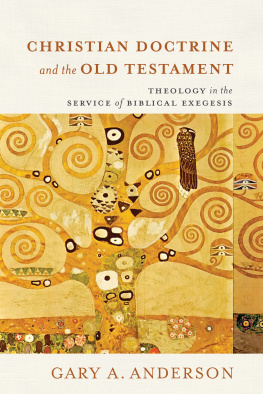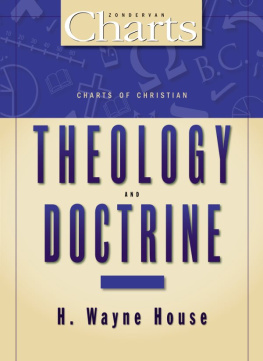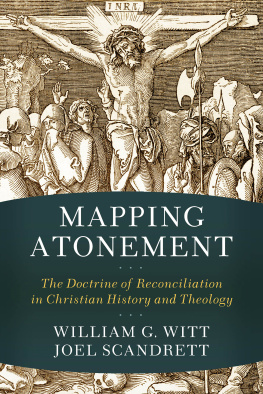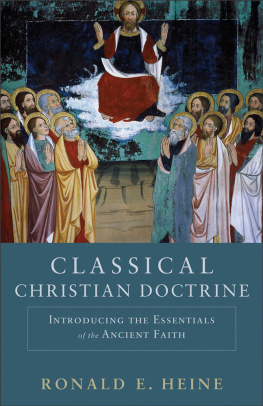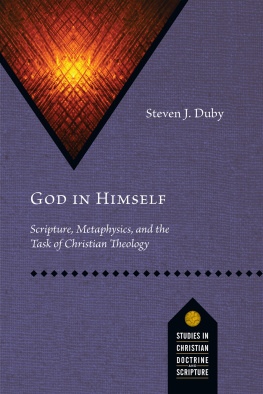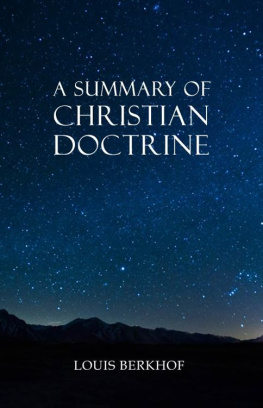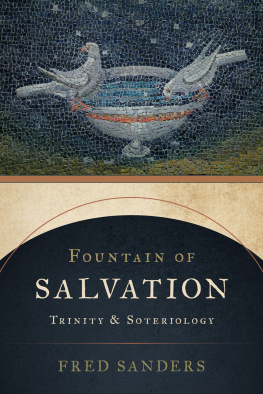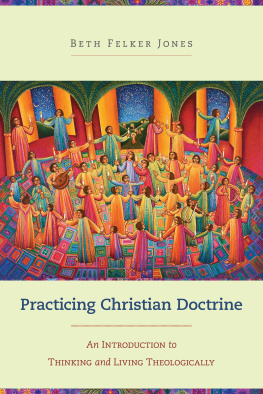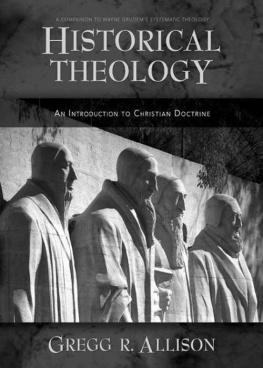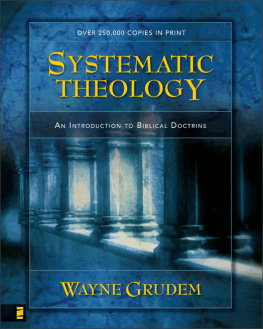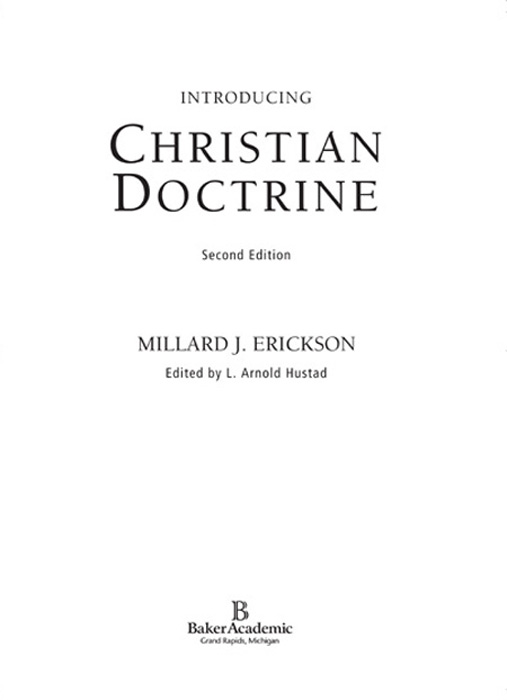
1992, 2001 by Baker Book House
Published by Baker Academic
a division of Baker Publishing Group
P.O. Box 6287, Grand Rapids, MI 49516-6287
www.bakeracademic.com
Ebook edition created 2012
All rights reserved. No part of this publication may be reproduced, stored in a retrieval system, or transmitted in any form or by any meansfor example, electronic, photocopy, recordingwithout the prior written permission of the publisher. The only exception is brief quotations in printed reviews.
eISBN 978-1-4412-0041-9
Library of Congress Cataloging-in-Publication Data is on file at the Library of Congress, Washington, DC.

Siri Mahal Erickson Inoferio
January 24October 14, 1991
Jesus said, Let the little children come to me,
and do not hinder them,
for the kingdom of heaven belongs to such as these
(Matthew 19:14 NIV )
Contents
Preface
For several years now, my book Christian Theology has served well the purpose for which it was designed: to be an introductory seminary-level textbook in systematic theology. The wide adoption and positive response by both instructors and students have been gratifying.
In addition, a number of instructors in Christian liberal arts colleges and Bible colleges have been using Christian Theology as a textbook in courses surveying Christian doctrine. Some of them have expressed their desire for a briefer version of this book, which would eliminate some of the more technical portions. They have convinced me that there is a group of students who could benefit from a work of this type. It was to meet this need that the present volume was prepared.
Introducing Christian Doctrine is so designed as to provide a preparation for and transition to Christian Theology. It agrees in style and in perspective with that larger work, many sentences having been taken over unchanged from it. Students and others who desire more extended discussions of some of the issues raised here, or treatments of some issues not addressed here, are encouraged to consult that larger work.
I am especially appreciative of the work of L. Arnold Hustad, professor of theology and philosophy at Crown College, who has served as editor of this project. It is always a source of satisfaction to an instructor to have a student of his calibre. He wrote his master of theology thesis under my direction and served as my teaching assistant during the 197273 academic year. His thesis on the doctrine of transcendence in the theology of Paul Tillich is one of the finest pieces of student scholarship I have had the privilege to read. It is a further source of gratification when ones student goes on to obtain his doctorate and enter a career of teaching and scholarship. An even greater satisfaction, however, comes when one is able to work with that former student as a colleague on a joint project such as this one. The process of condensation has been one in which he and I jointly decided upon the nature and extent of the changes to be made, largely at his suggestion. He then did the major work of deletion and condensation, and I rewrote some portions. So while the content is entirely mine, the form of that content, as compared with Christian Theology, is largely his. We then reviewed each others work. He has shown excellent judgment, balance, and a sense of the needs of undergraduates, which is based upon his several years of experience teaching. He also gave the result of our joint labors a pilot test in his course in Christian theology at Crown College during the summer of 1991.
I am grateful for the suggestions of a number of undergraduate instructors. I am also especially appreciative of the students at Crown College who used a draft of this work as a textbook. Their comments and observations enabled us to make a number of improvements in the final product. The encouragement of Baker Book House, and especially of Allan Fisher, was also of great help in bringing this endeavor to fruition.
M ILLARD J. E RICKSON

ONE
What Is Theology?
Chapter Objectives
After studying this chapter, you should be able to do the following:
- To compose a brief definition of theology.
- To demonstrate the need for doctrine in contemporary society.
- To identify alternative starting points for studying Christian doctrine.
- To list and explain each of the steps involved in developing an adequate theology.
Chapter Summary
Christian theology seeks to understand the God revealed in the Bible and to provide a Christian understanding of Gods creation, particularly human beings and their condition, and Gods redemptive work. With Scripture as its starting point, theology is most effectively developed by following a definite methodology.
Study Questions
- State and explain five facets of the definition of theology.
- Explain why theology may be considered a science.
- Identify the potential sources for Christian doctrine, and explain why this question is important.
- Describe the process of doing theology and illustrate how it should be done.
Chapter Outline
The Nature of Theology
Theology as the Study of Doctrine
The Necessity for the Study of Doctrine
Theology as Science
The Starting Point for the Study of Christian Doctrine
The Method of Theology
- Collection of the Biblical Materials
- Unification of the Biblical Materials
- Analysis of the Meanings of Biblical Teachings
- Examination of Historical Treatments
- Identification of the Essence of the Doctrine
- Illumination from Sources Beyond the Bible
- Contemporary Expression of the Doctrine
- Development of a Central Interpretive Motif
- Stratification of the Topics
The Nature of Theology
Theology as the Study of Doctrine
To some readers, the word doctrine may prove somewhat frightening. It conjures up visions of very technical, difficult, abstract beliefs, perhaps propounded dogmatically. Doctrine is not that, however. Christian doctrine is simply statements of the most fundamental beliefs that the Christian has, beliefs about the nature of God, about his action, about us who are his creatures, and about what he has done to bring us into relationship with himself. Far from being dry or abstract, these are the most important types of truths. They are statements on the fundamental issues of life: namely, who am I, what is the ultimate meaning of the universe, where am I going? Christian doctrine is, then, the answers that the Christian gives to those questions that all human beings ask.
Doctrine deals with general or timeless truths about God and the rest of reality. It is not simply the study of specific historical events, such as what God has done, but of the very nature of the God who acts in history. The study of doctrine is known as theology. Literally, theology is the study of God. It is the careful, systematic study, analysis, and statement of Christian doctrine. Certain of its characteristics will help us understand the nature of the theological enterprise:
1. Theology is biblical. It takes its primary content from the Old and New Testament Scriptures. While additional insight may be obtained by the study of Gods creation, or what is sometimes referred to as the book of Gods work, it is primarily Gods Word that constitutes the content of theology.
Next page

